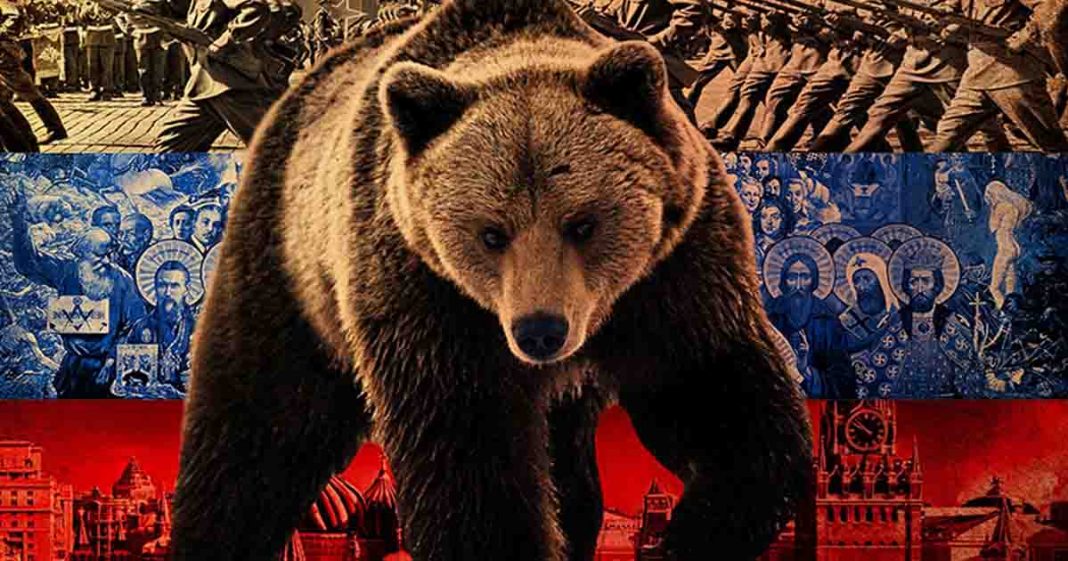Historical Excursus on Information Warfare
If we take the prototype of Western war to be based on Homer’s historic epic the “Iliad” (the episode of the creation of the Trojan horse and the subsequent deception), then it would be safe to ascribe its Eastern counterpart as Sun Tzu’s “Art of War”, according to which informational supremacy gives one a clear advantage over the enemy making it a significant prerequisite for victory.
An analogous strategy that is relatively less well known is extracted from the work by Kautilya (born and educated in Taxila, in modern day Pakistan) called “Artashastra”. This can also be considered an Eastern classic that propels the tenets of strategic thought forward incorporating elements of unconventional warfare in its philosophy. With the advanced development of the art of warfare, technology, and diplomacy, the approach towards informational conflict has encountered drastic changes throughout different eras of human civilization.
Read more: Putin’s “Invincible” missile and its significance in Pakistan-Russian embryonic cooperation
It is believed that in the span of only one century, the Byzantine Empire managed to successfully fuse diplomatic methods, military logistics, and border surveillance, incorporating within this framework a sophisticated network of spies and a system of outposts. Only a small percentage of people are able to decipher the fact that scientific methodology also harbours within itself elements of informational conflict.
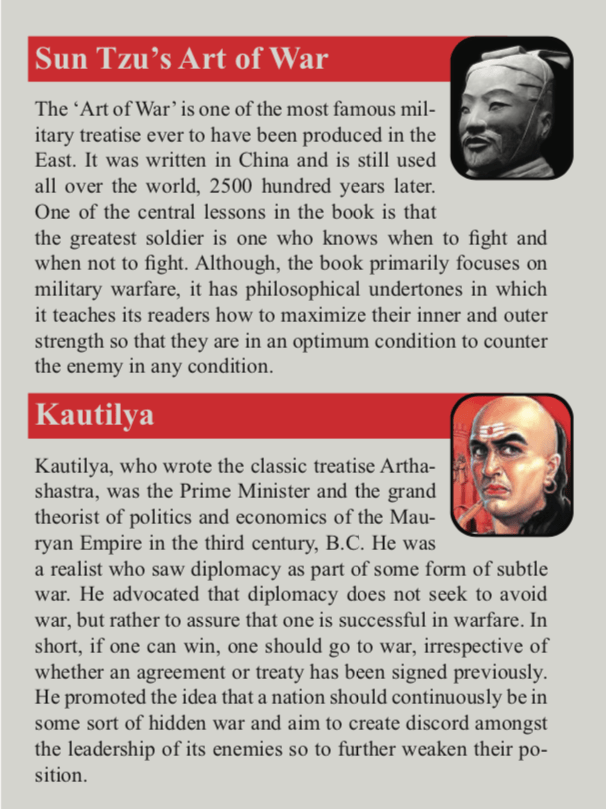
To cite a relevant example, the term ‘conference’ (from the Latin confer – collect in one place) first appeared in Medieval Europe based on an initiative taken by Abbot Peter the Venerable, who proposed engaging the westward-moving Muslims in polemics (in this case a geographical term is not being used due to the fact that we would have to delve into the long history of Muslim armies moving to the north and northwest).
In order to do this, it would have been necessary to study the Quran and evaluate Muslim traditions in great detail. The advent of the printing press, the emergence of newspapers and later inventions of radio and television introduced efficient mediums with which information warfare could be waged. In his work “The Gutenberg Galaxy”, Marshal McLuhan strategically demonstrates how the use of literacy and information as a mechanism of influence shaped the history of Medieval Europe, including the manifestation of religious wars.
Read more: Will Russian S-400 missile defense system save Erdoğan from another Western…
However, within a short period, the process of decentralisation of ‘the word’ began to take place reshaping the course of history yet again. The dissemination of propaganda steadily began to be monopolised by states and oligarchic groups both of which were closely related to the political establishment. Over the course of time the target groups also began to transform which is why the dire need for innovative approaches to information arose causing simplified templates to be created for the mass manipulation of public opinion.
With the ushering of the bipolar era, a confrontation between the socialist and capitalist camps was inevitable and there was a dire need to account for the growth of national liberation movements, economic growth, and the rights and freedoms of citizens, all of which began to come to the forefront of the transformed political and social landscape.
This was a clear exhibition of the radical differences between the approaches of these two main groups, both of which existed on polar ends of the social spectrum. In the United States, the very term ‘propaganda’ (which in itself is a rudiment of Jesuit strategy, for propaganda fide: – propaganda of the faith) was strategically used during the Soviet Union agitation whenever political information was brought to light.
Read More: The New Digital Battlefield: Information warfare in our pocketbook
Internet: Monopoly of Information Propaganda Leaves the State’s Hands
However, the emergence of the Internet and the advancement of communication services destroyed the monopoly of states for all practical purposes and the iron fist with which states controlled information loosened tremendously.
The recent attempts made by many countries to exercise control and censorship over the internet, control traffic, and the use of litigation to exterminate supposedly ‘fake news’ clearly exhibits the desperation with which states are trying to regain their hegemony over information.
Effective communication systems that have assisted political activists, have also enabled extremist organisations (including terrorist groups) to stage and spread their anti-government activities on an unprecedented level.
The exponential growth in the influence garnered by non-governmental organizations, including the mobilization of radical movements such as the international anti-globalist movement, are also closely related to the emergence of these new sophisticated communication systems.
As a consequence of these advanced communication systems that enable all segments of the population to interact in cyberspace without boundaries presents hitherto helpless people with the opportunity to now effectively organize decentralized participation in different mirrored summits (i.e. mass protest actions during meetings of the International Monetary Fund, the G7, the Davos Forum, NATO summits, etc.), mobilize supporters, quickly spread critical information (including alternative points of view), and mark targets for attack ( ranging from critical opinions and the signing of petitions to hacker attacks and international campaigns).
However, these effective communication systems that have assisted political activists, have also enabled extremist organizations (including terrorist groups) to stage and spread their anti-government activities on an unprecedented level. This is what has escalated the need for information censorship on the internet and brought forth the urgent need for stronger controls to be placed on the Internet ultimately resulting in the dire need for a special international policy for cyberspace.
Read More: DG ISPR Gen. Babar Iftikhar on Pakistan & Fifth Generation Warfare
Russian State and Information Operations
As far as the specifics of conducting information operations in Russia are concerned, the following points are of utmost importance. During the second half of the 20th-century, along with the official Soviet media that was specifically oriented towards foreign governments, intelligence services also managed to execute targeted information campaigns, which were referred to as ‘active events’.
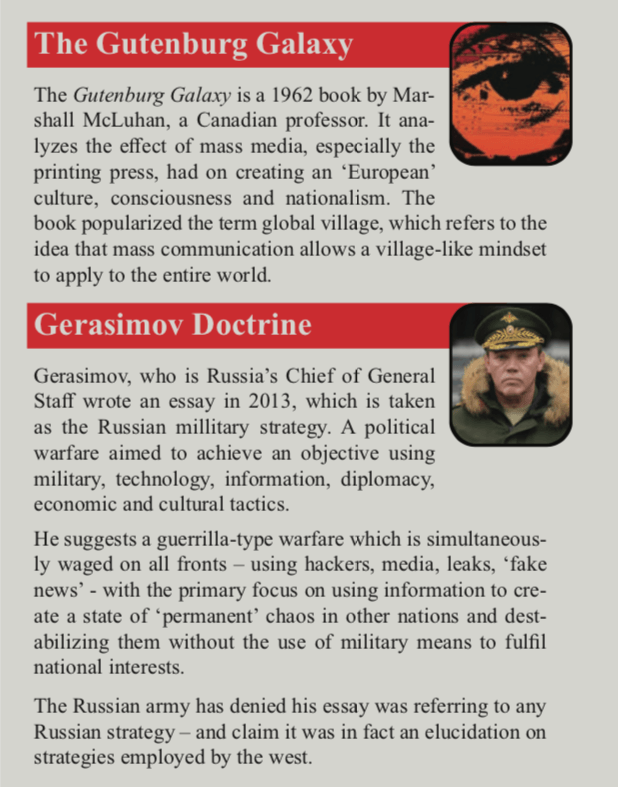
First, a theme and source to spread a particular publication were carefully selected, after which a critical evaluation of its potential effectiveness on public opinion was gauged that included the persons that were in respective positions of authority.
After the fall of the Soviet Union, for twenty years, Russia was not involved in the execution of informational operations abroad. However, Western intelligence services and foreign companies continued to be actively involved in Russia through non-governmental organisations and mass media outlets that were financed from abroad.
Read more: NATO attacks & disinformation leaks in international media, why?
On November 25, 2017, a law was passed that required these outlets to officially declare their status as ‘foreign agents’ (earlier, an analogous measure was taken for non-governmental organisations that were either branches of foreign structures or created in compliance with foreign elements).
The relevant legislation is as follows: The Federal Law No. 327-FZ of November 25, 2017, “On Amendments to Articles 10.4 and 15.3 of the Federal Law” On Information, Information Technologies and Information Protection “and Article 6 of the Law of the Russian Federation” On Mass Media “.
The dissemination of propaganda steadily began to be monopolised by states and oligarchic groups both of which were closely related to the political establishment.
These laws were adopted by the State Duma on November 15, 2017, and later approved by the Federation Council on November 22, 2017. Currently, the term information war has come to have many synonyms in Russia. Other terms that refer to this information war include manipulation of public opinion, informational-psychological warfare, cognitive warfare, political spin, black PR, behavioural weaponry and conflict of values.
All these concepts and terms that are used are primarily based upon the specific viewpoint of the author who uses them, the theme of his or her research, the approach that is used while describing the phenomenon, and last but not least political interests.
The term informational conflict is a vast term and has an array of interpretations as it does not specifically refer to the ideological, military, and political spheres of a given state but also aims to emphasize the importance this phenomenon has for a society as a whole in a temporal-historical perspective. Therefore under its auspices, information warfare in itself is a pivotal element.
Read more: Why defense cooperation with Russia is vital for Pakistan?
What is more astonishing is the fact that there are no generally acknowledged judicial and moral norms and limitations to the ways and means of information warfare; they are only limited by considerations of their effectiveness making the given situation more precarious and dangerous than other means of conventional warfare.
Colour Revolutions Awakened Russians to the Importance of ‘Information Operations’
Western instruments and methods like strategic communications (under the auspices of NATO or other Euro-Atlantic and Western structures), as well as the role, played by the informational component in the process of organizing‘ colour revolutions’ and the waging of hybrid wars are currently receiving significant attention in Russia.
The armed conflict in South Ossetia and the operation to force Georgia to accept a peace treaty, which was conducted by Russia in 2008, demonstrates both the effectiveness and scope of informational operations in relation to military activities.
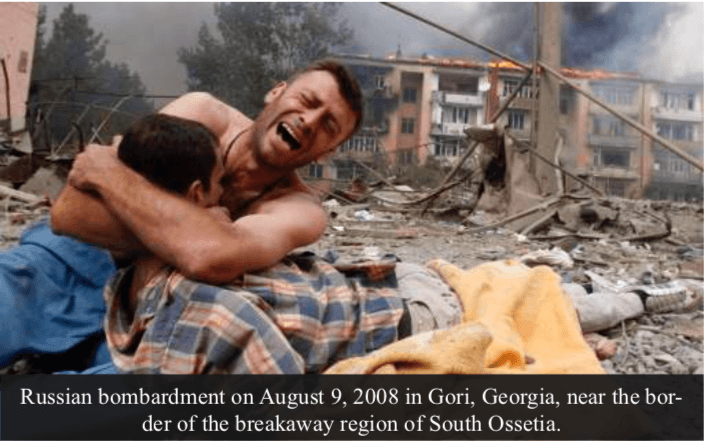
At the time, the so-called victim phenomenon was also observed and studied in great detail. For example, the Georgian president declared, “more than 80 thousand soldiers invaded our territory, more than three thousand armoured units entered the country, and around a thousand more stood waiting at our borders.
Read more: Pakistan-Russia counter terrorism co-operation
Our territory was bombed by several tens if not hundreds of aircraft, which executed more than 200 military runs. This was really an attempt to uproot and destroy our people.” In reality, the following forces were sent against Georgia: South Ossetia’s forces numbered 3 thousand troops and no less than 20 tanks and 25 SPGs, Abkhazia’s 5 thousand troops, and Russia’s contingent was numbered at 15 thousand troops.
It is important to note that at that time Russia did not utilize informational means to invalidate the misrepresentation of information that was being presented as the truth. Despite that the military and intelligence services had satellite images that showed the literal damage that was done to Ossetian infrastructure by the Georgian armed forces, the information and images were not strategically used to disseminate this information through the medium of official international structures.
All the information about the victims of the Georgian population of South Ossetia was spread at the beginning of the conflict via social media and the entire coverage of the campaign was mainly executed by enthusiast bloggers and not by official Russian media outlets.
Read more: Rex Tillerson harshly criticizes Russia in order to rally NATO allies
After the events in South Ossetia, Russia’s leadership realized that they need to take a more serious attitude towards issues of informational activity. As a result, the standard work of Russian media companies (especially RT and Sputnik) that constitute the media agency “Rossiya Segodnya” became a subject of immense criticism by the establishment of Western countries. In reality, the success of the Russian media was based on the presentation of an alternative viewpoint on current world events.
That alternative worldview shed light on the political, social and economic realities of the current world order and therefore immense criticism of the two-faced standards of the EU and US leadership was inevitable. Generally speaking, the realization of information campaigns and defense against informational warfare is now strengthened and backed by several Russian doctrinal documents.
Information Warfare Through the Message of Globalisation
In the latest National Security Strategy (Order of the President of the Russian Federation on 31.12.2016 N 683 “About the National Security Strategy of the Russian Federation”), a series of points is specifically dedicated to informational aspects. In particular, it is clearly stated that “new forms of anti-government activity are appearing, especially forms involving the use of high-tech, communications, and informational technology.
With the goal of securing strategic deterrence and averting military conflicts, interconnected political, military, military-technical, diplomatic, economic, informational, and other measures which are dedicated to the prevention of military force being used against Russia and to the defense of her sovereignty and territorial integrity, are being developed and realized.”
Read more: Survival in the age of information warfare
“Activities, related to the use of informational and communications technologies for the spreading of propaganda of the ideology of fascism, extremism, terrorism, and separatism are doing damage to the civil society and creating a negative impact on the political and social stability of society”, not to mention these communication and information systems are also now considered as fundamental threats to the security of the state and society.
In the section on culture, it is written that “threats to national security in the area of culture include the dilution of traditional Russian spiritual-moral values, the weakening of the unity of the multinational people of the Russian Federation by way of external cultural and informational expansion (including the spreading of low-quality mass cultural products), propaganda about permissiveness and violence, racial, national, and religious intolerance which also results in the diminution of the role of the Russian language in the world, the quality of Russian language education in Russia and abroad, attempts to falsify Russian and world history, and illegal infringement of cultural objects”.
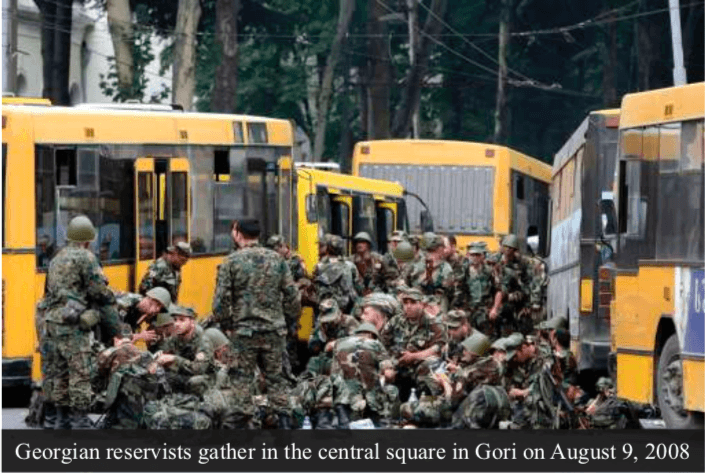
In order to secure cultural sovereignty, strict measures are now being taken in accordance with this counter-strategy that has been designed for the defence of Russian society from external ideological-moral expansion, destructive informational-psychological influence including the banning of the spread of productions with extremist content, violent propaganda, as well as breeding racial, religious and international intolerance.
Read More:Rise of social media is fuelling interest in cyber-warfare
Russian Military Doctrine Recognizes Import of Information Warfare
In the Military Doctrine of the Russian Federation (which was accepted on 25.12.2014), significant attention has also been given to key informational aspects. It clearly states that “a tendency towards the movement of military dangers and threats towards the informational space and internal sphere of the Russian Federation has been noted”.
The “usage of informational and communications technologies for military-political goals to realize actions which are in opposition to international law are directed against sovereignty, political independence, the territorial integrity of states, or representing a threat to the international world, security, and global and regional stability” are categorized as external political threats.
What is more astonishing is the fact that there are no generally acknowledged judicial and moral norms and limitations to the ways and means of information warfare; they are only limited by considerations of their effectiveness.
Internal military hazards include “activities involving informational actions on the populace, mainly on the young citizens of the country, with the aim of disrupting the historical, spiritual, and patriotic traditions in the area of defense of the Fatherland”.
Tasks that involve the prevention of conflict are “the creation of conditions which secure the lowering of the risk of the use of informational and communications technologies for military-political goals with the aim of realizing actions that stand in opposition to international law or are directed against sovereignty, political independence, or the territorial integrity of states and which represent a threat to the international world, security, and global and regional stability”. Specific tasks for the equipment of the armed forces include “the development of forces and means for informational conflict”.
Read More: The Doctrine of Information War and Global Dynamics
Gerasimov Doctrine and the Reality of the Russian Hybrid War
The Gerasimov doctrine has become extremely well known in the West. There was a publication by the head of the General Command of the Russian Armed Forces, Valery Gerasimov, in the February 2013 edition of the “Military-political Courier” that was titled “The value of science for prevision”.
Later, it was translated into English and published in the “Military Review”, as a consequence of which it was misinterpreted as a revelation of Russia waging a hybrid war. Basing his analysis on the consequences and observations made of the notable ‘Arab Spring’ and the ‘colour revolutions’ in the post-Soviet space, Gerasimov noted, that the “ascent of the methods used during conflicts is moving towards the wide application of political, economic, informational, humanitarian, and other military measures, which are realized by the activation of the protests potential in a population.
All of this is further exacerbated when it is complemented by military measures that are of a hidden character, including the realization of informational warfare events and Special Forces actions. Open deployment of forces that is executed partially under the strategic cover of peacekeeping activities and crisis settlement is only begun at a certain stage, mainly after definite success in a conflict has been reached.
Read more: Russian defense minister confirms setting up unit for counter-propaganda
According to Gerasimov, the relation between non-military and military measures while waging informational conflicts is four to one making this conflict a kind of interface between a complex of military measures, from peacekeeping operations to non-military measures, which also include the formation of political opposition, economic sanctions, political and economic pressure, and more.
Gerasimov attributed all armed conflict present in physical areas as well as the informational space to this new form of warfare while incorporating the application of asymmetrical and indirect actions. It is interesting, that Gerasimov’s conclusions in many ways resemble those of another Russian book which was titled “The Coaching War”, and was presented in Russia earlier this year.
It is clear that the cybersphere is now also viewed as a field of informational conflict. Considering that the Internet in itself is an invention of the Pentagon and keeping in mind that the majority of social networks and applications were initially developed by American companies, the United States is obviously the undisputable leader of cyberspace (including military operations such as cyber forces).
Read More: What is hybrid warfare? – Ikram Sehgal
However, Russia is also gradually beginning to gain mastery over cyber technologies, which can then be implemented and utilized by current agencies, including military structures. In 2014, three subdivisions were created in the Russian Ministry of Defence (MoD) that deal with extensive research in the sphere of technology, information, and communications.
Considering that the Internet in itself is an invention of the Pentagon and keeping in mind that the majority of social networks and applications were initially developed by American companies, the United States is obviously the undisputable leader of cyberspace.
Another MoD structure is now selecting specialists on information security, who are capable of conducting vast research regarding the security of systems against hackers and experts at decoding telecommunication protocols. The MoD commands that are linked to IT, telecommunications, robots, and innovation are united in a System for Future Military Research and Development.
This includes the Main Office for Scientific-Research Activities and the Technological Maintenance of Advanced Technologies (Innovative Research) of the Russian Ministry of Defence, an Informational-Analytical Centre (for the collection, analysis, and preparation of information) of the Russian Ministry of Defence, and the Coordinated-Expertise Office (for scientific and research activities) of the Russian Ministry of Defence.
Defence minister Sergey Shoigu officially declared the creation of information technology armies in the Armed Forces of the Russian Federation in the State Duma in February 2017. It is important to note that these subdivisions do not conduct propaganda on social media networks and do not invite hackers like the Pentagon and Western intelligence agencies.
“Activities, related to the use of informational and communications technologies for the spreading of propaganda of the ideology of fascism, extremism, terrorism, and separatism are doing damage to the civil society and creating a negative impact on the political and social stability of society”, not to mention these communication and information systems are also now considered as fundamental threats to the security of the state and society.
They are also not involved with the launching of hacking attacks that aim to steal information or disturb activities. Their tasks are solely based on the defense and safeguarding of the critical infrastructure of the Russian Ministry of Defence, the search for vulnerabilities, and their subsequent correction.
Read more: Russian defense minister warns NATO against prodding Russian bear
Although the mass media has defined these activities as coming under the umbrella of cyber forces, they have not yet been given this title officially. Electronic warfare, which is the suppression of enemy communications and command systems, is also not an inherent part of their prerogatives.
These activities are simply carried out by the electronic warfare units that are part of the Russian Federation’s special armies. Generally speaking, the activities of the Russian military that do relate to informational operations have a strictly defensive character.
If we are to compare them with the work of NATO or the Pentagon, we will find that in the West both aggressive cyber-weaponry (including day zero exploits and harmful software, which is also a threat to its country of origin due to the peculiarities of the global cybersphere), as well as refined propaganda and counter-propaganda tactics ranging from hashtag operations to memetic warfare are also being actively developed.
Such aggressive strategies can potentially result in another round of conflict due to the fact that the states that are attempting to defend their sovereignty will inevitably seek to block such activities.
Leonid Savin is the Director of the Foundation for Monitoring, Forecasting of Development of Cultural Territorial Spaces and Editor-in-Chief of the “Geopoliticа.ru” internet portal. He is also a senior expert of the Center of Geopolitical Research, a Russian think-tank established in 2000; Head of administration of the International social movement “Eurasian Movement” (from 2007), founder and editor-in-chief of the “Journal of Eurasian Affairs” magazine. He has published numerous books including Coaching War, Moscow, 2017, New Methods of the Warfares: How the US governs its Empire, Moscow, 2016, From Sheriff to Terrorist. Essays on U.S. geopolitics, Moscow, 2012. He has a forthcoming book on Cybergeopolitics, Moscow.
The views expressed in this article are the author’s own and do not necessarily reflect the editorial policy of Global Village Space.


